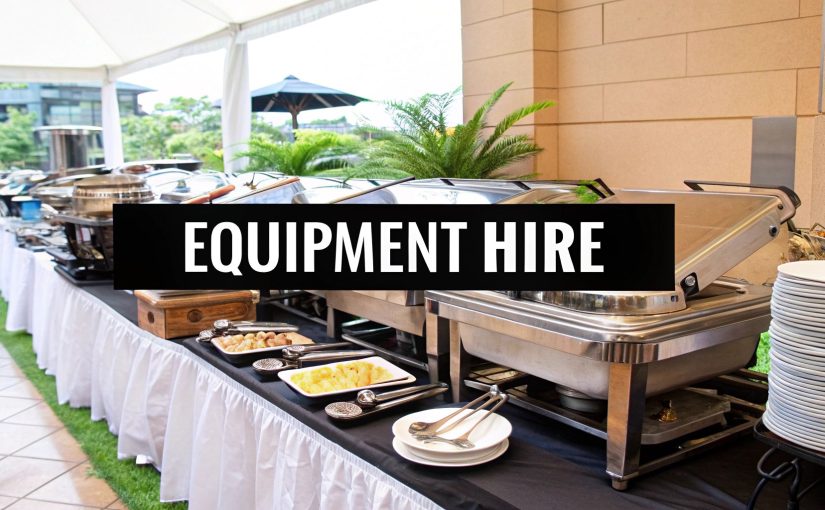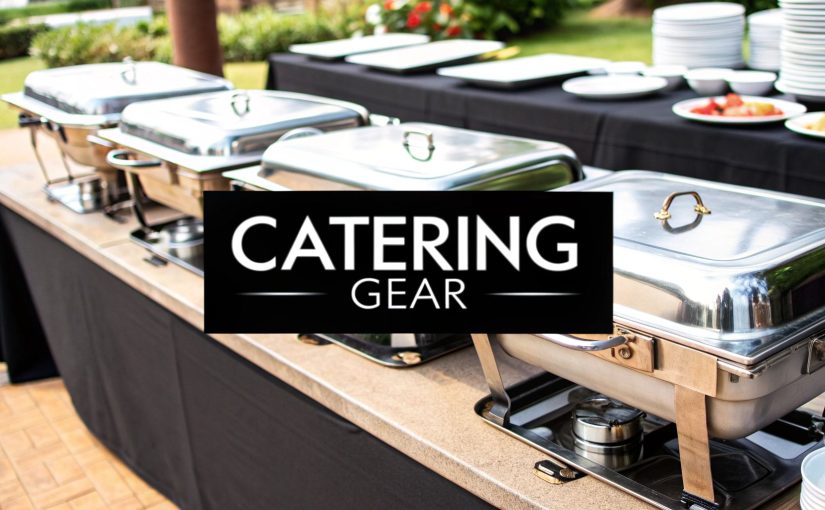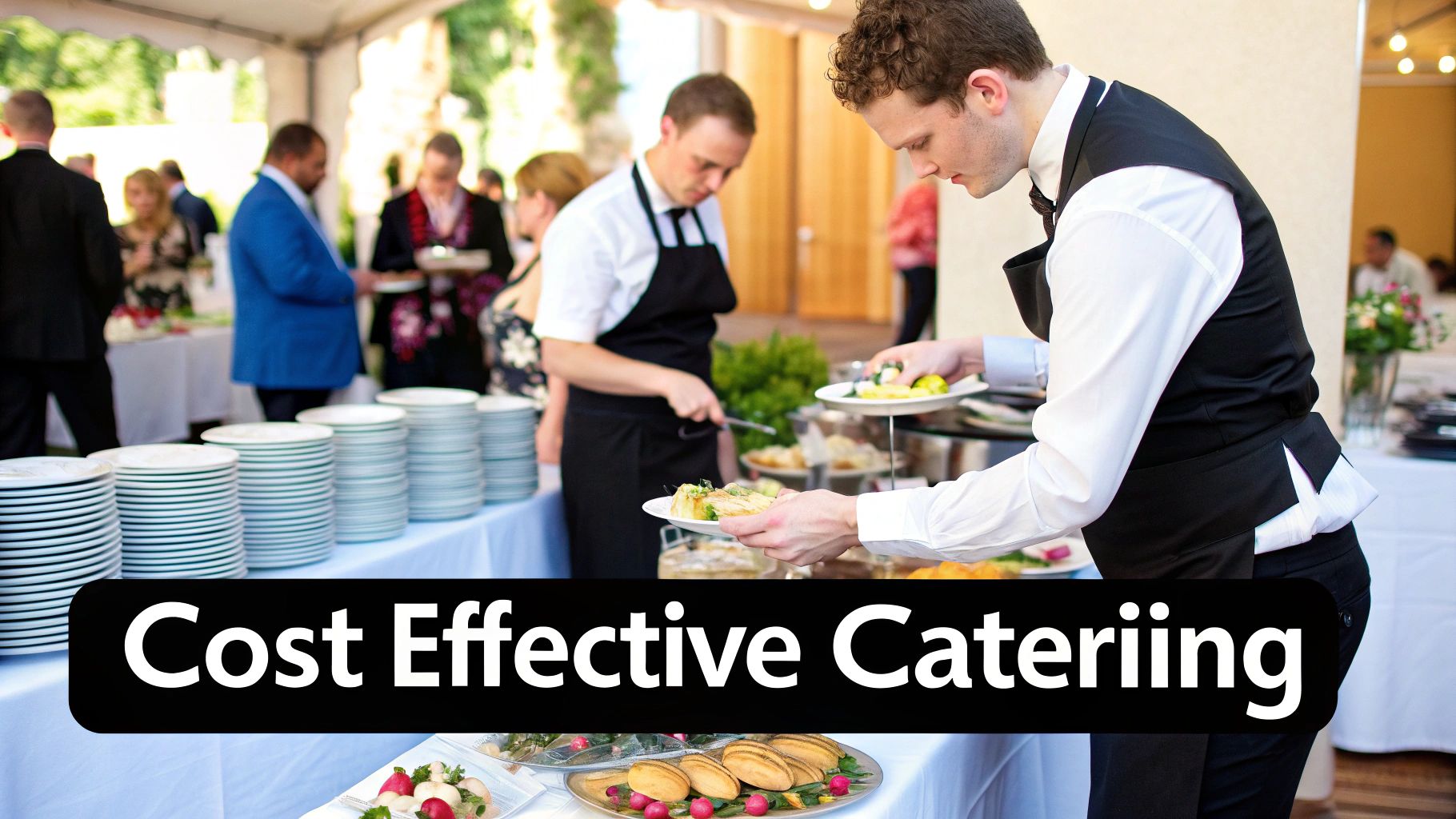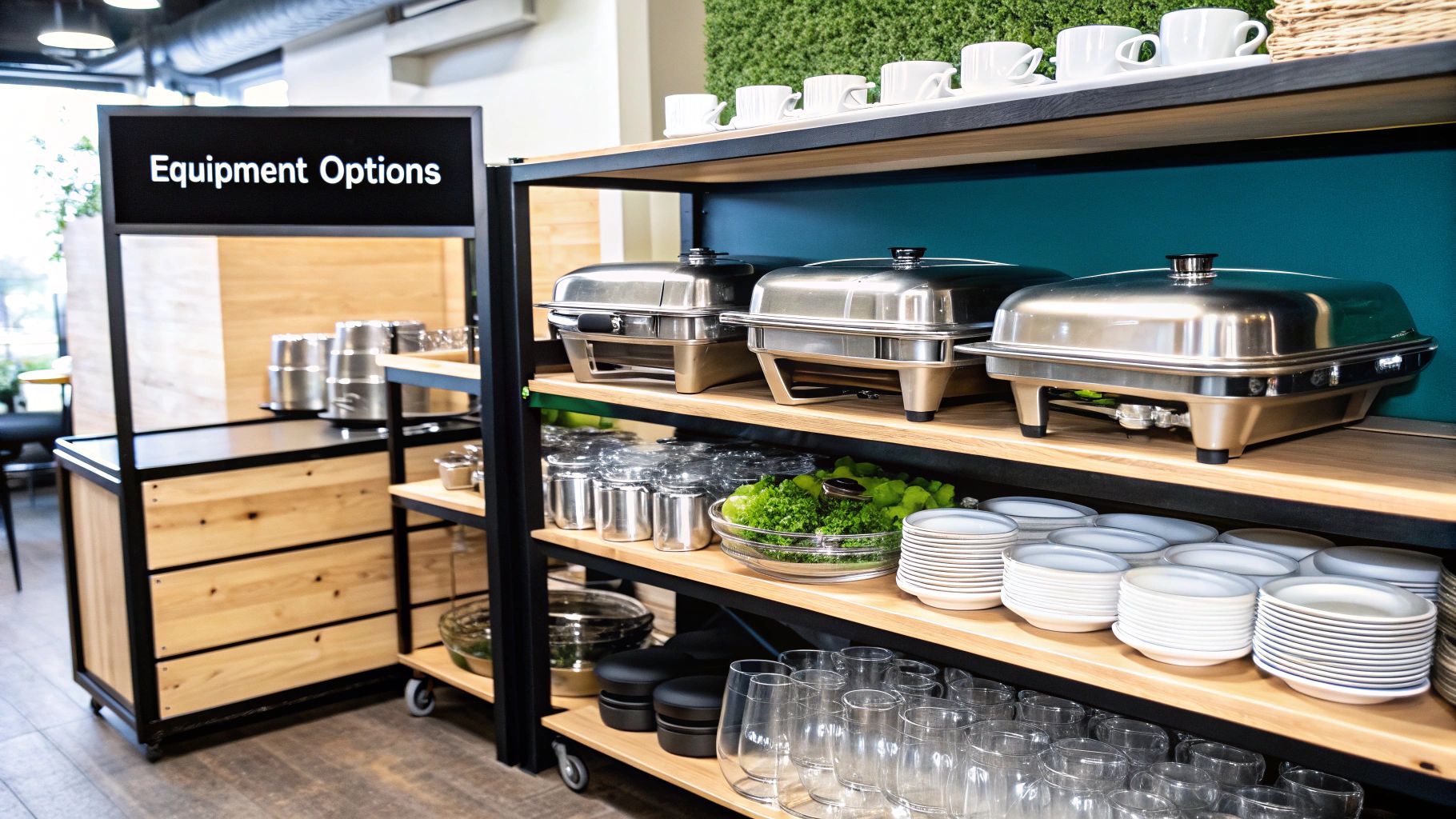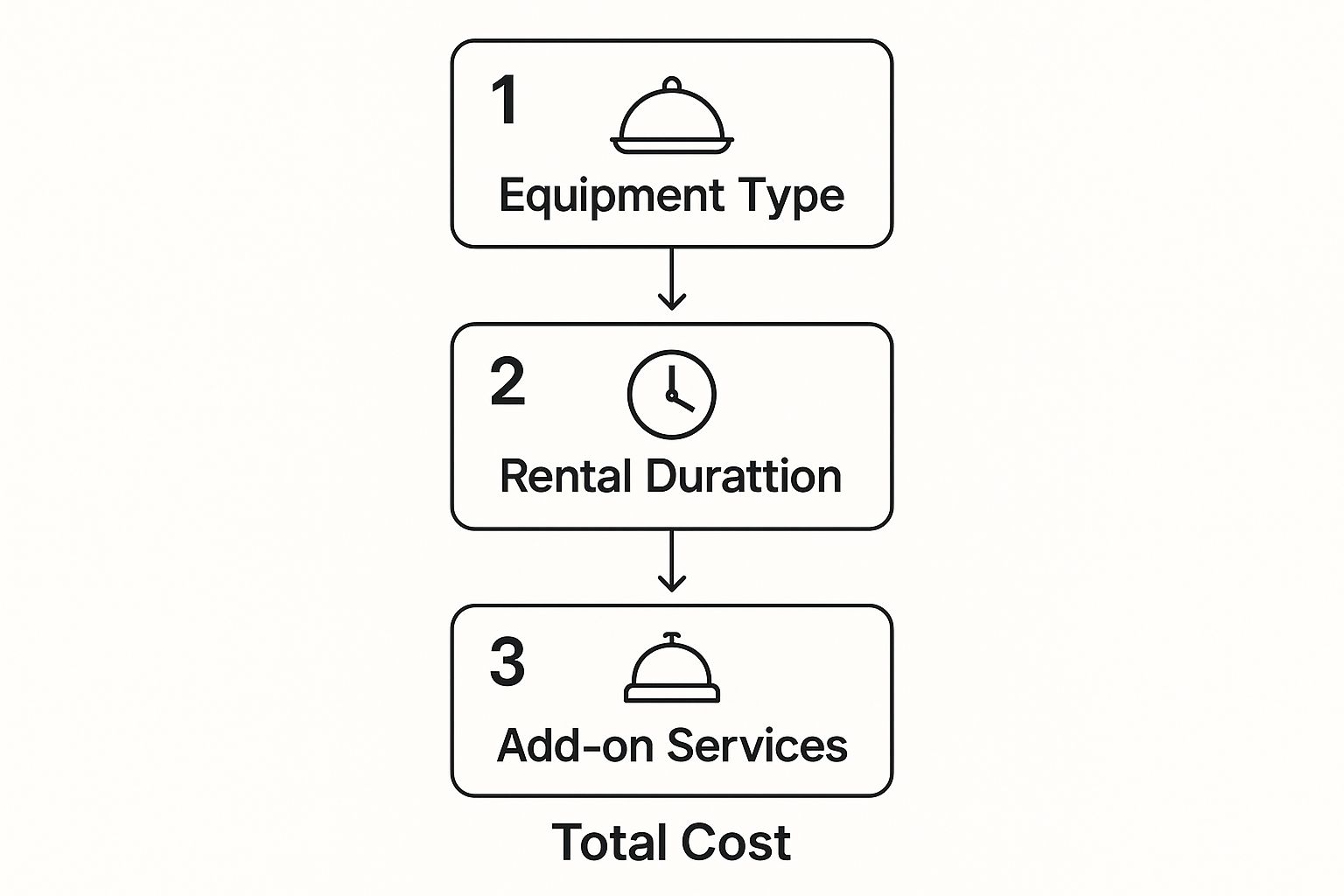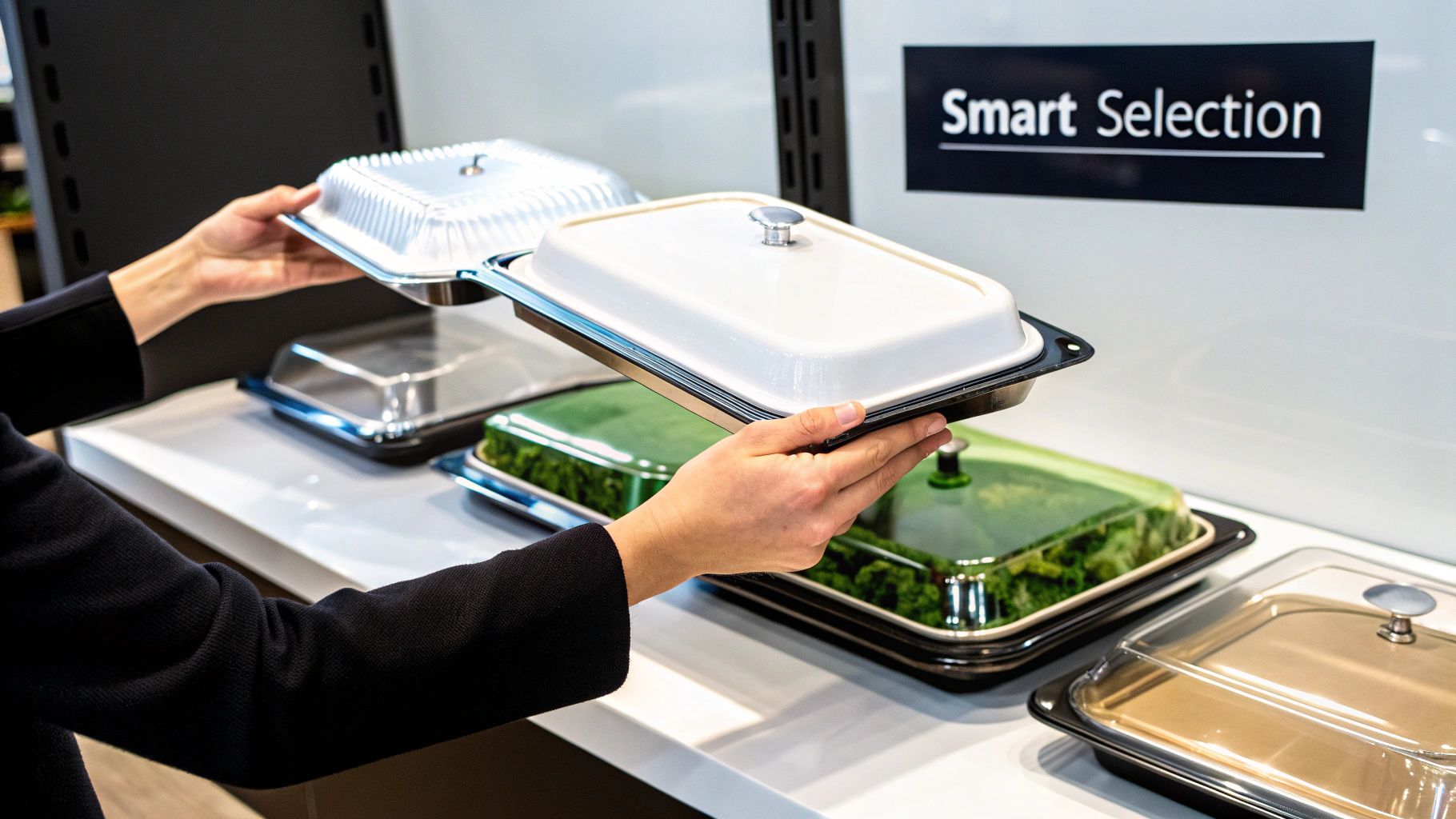When you’re in the thick of event planning, the list of decisions feels endless. But let’s be honest, few things make or break an event like the catering setup. Going the route of catering equipment for hire is one of the smartest moves you can make. It gives you access to professional-grade gear without the eye-watering cost of buying it all outright. Forget about storage, maintenance, and watching your investment lose value—hiring just makes more sense.
Why Hiring Catering Equipment Is a Smarter Choice
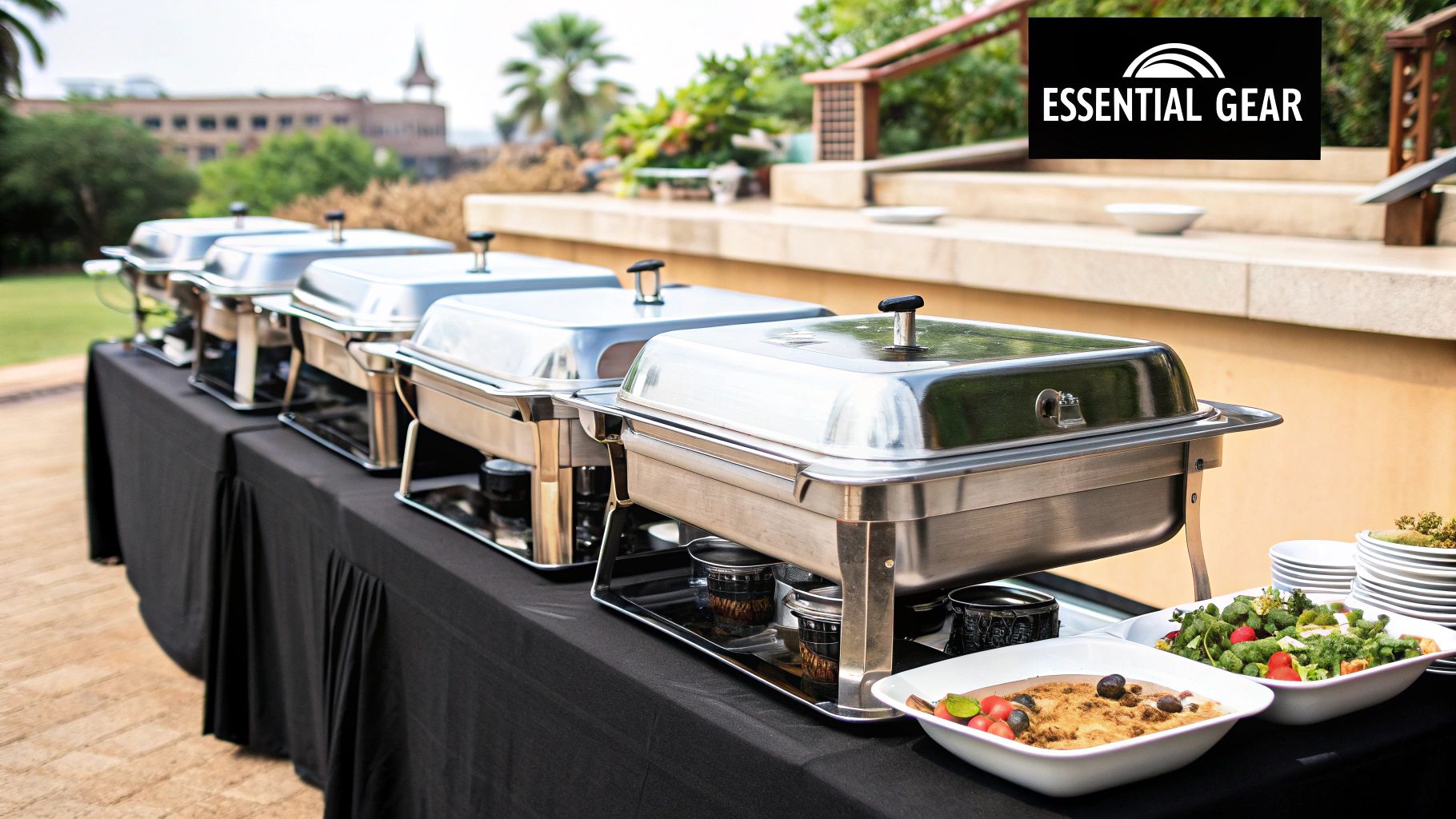
Whether you’re pulling together a sleek corporate launch in Sandton or a dreamy wedding in the Cape Winelands, your budget and logistics are always front and centre. The “hire vs. buy” debate for catering equipment comes up every time, and honestly, the case for hiring is incredibly strong.
Keep Your Finances Flexible and Your Risk Low
The most obvious win is financial. Buying commercial-grade ovens, chafing dishes, and mobile refrigeration units costs a small fortune. That’s cash tied up in equipment that could be making a real difference elsewhere, like in your marketing or elevating the guest experience.
By choosing catering equipment for hire, you turn a massive capital expense into a simple, manageable operational cost. This way, you can get your hands on top-tier, specialised gear for a fraction of the purchase price, fitting it neatly into your event budget. There’s no scary long-term commitment and zero risk of being stuck with equipment that’s old news in a year.
“Hiring allows you to scale your ambition without scaling your liabilities. You can execute a high-end gala one weekend and a rustic outdoor festival the next, all with the perfect equipment and without owning a single piece of it.”
Ditch the Headaches of Ownership
Owning gear isn’t just about the initial price tag; it comes with a whole set of hidden chores. You need a secure place to store everything, and space costs money. On top of that, commercial equipment needs regular, professional servicing to keep it safe and working correctly—another cost that just keeps coming.
Hiring lets you sidestep all of that. A professional hire company takes care of the storage, cleaning, and maintenance. You get gear that’s been professionally looked after, PAT tested for electrical safety, and is ready to go the moment it arrives. It’s a hands-off approach that frees you up to focus on what you do best: running a flawless event.
In South Africa, the catering equipment rental market is buzzing, right alongside our vibrant events and hospitality industry. More and more, caterers are choosing to hire so they can use the latest tech without the massive price tag. It’s this kind of flexibility that helps them stay competitive as event styles and guest expectations constantly change. You can dive deeper into these catering equipment rental trends and their financial benefits.
Defining Your Event Needs Before You Hire
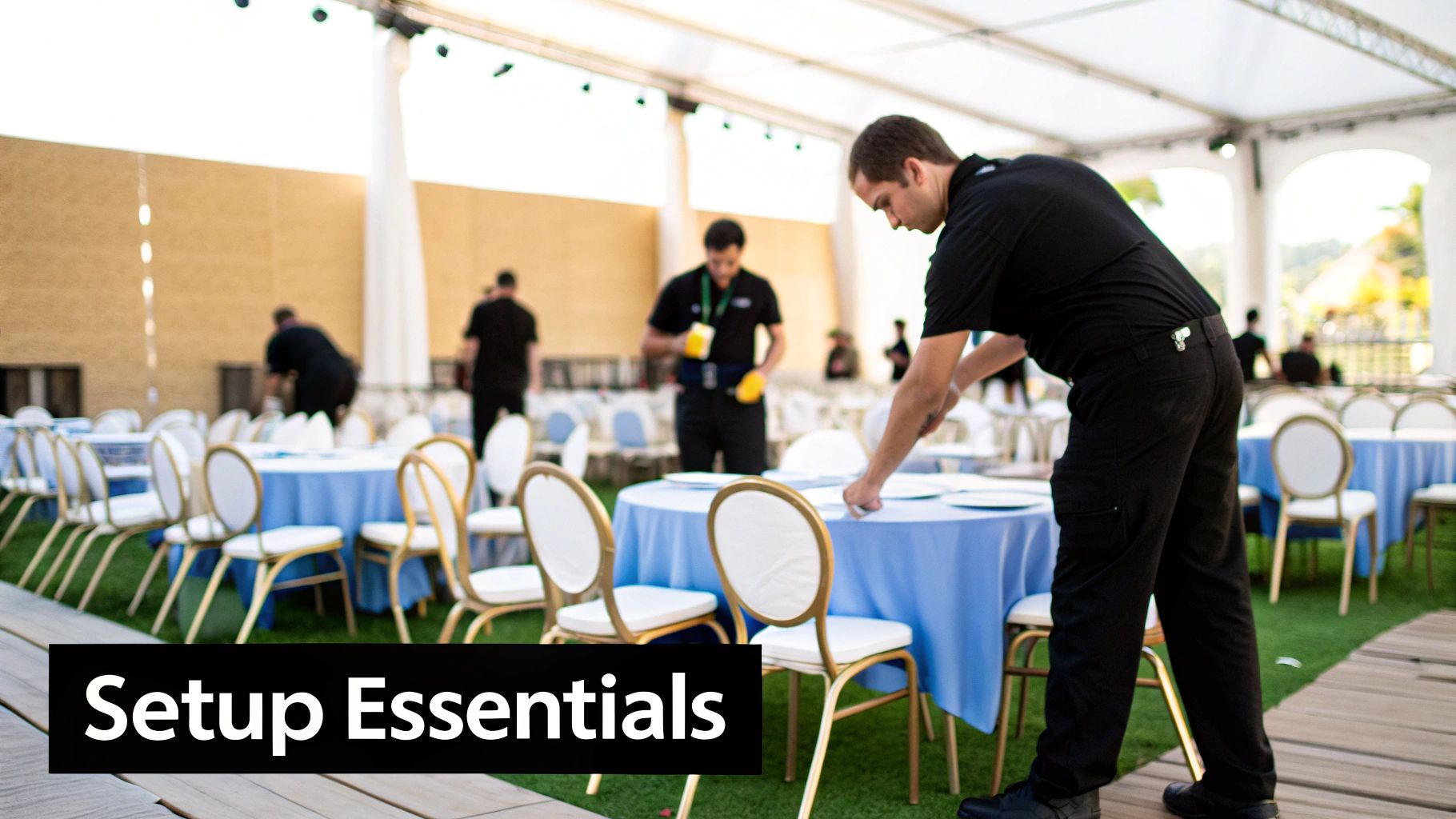
Before you even start browsing a rental catalogue, the most important thing you can do is map out the reality of your event. A little bit of planning upfront saves a world of last-minute panic and makes sure you only spend money on equipment you’ll actually use. It’s this strategic thinking that separates a smooth operation from a chaotic one.
Start with the heart of your event: the menu. Are you planning a relaxed, buffet-style harvest table, a formal plated dinner, or maybe some interactive food stations? Your answer changes everything. A buffet needs chafing dishes and plenty of serving utensils, whereas a plated meal requires plate warmers and a slick, organised plating area.
Then, think about how much cooking will happen on-site. If you’re just finishing and plating pre-cooked meals, your needs will be pretty simple. But if you’re cooking an entire meal from scratch in a marquee, you’re going to need a full field kitchen. This is a critical distinction to make when you start looking at catering equipment for hire.
Assessing Your Venue’s Capabilities
Every venue is different. A Stellenbosch wine farm has a completely different set of challenges to a modern Cape Town loft. Never assume anything! Get a checklist together and investigate the specifics before you commit to any rentals.
- Power Supply: Find out exactly how many power outlets are available and where they are. The crucial question is about the available amperage—you need to know you won’t overload the circuits with high-draw equipment like convection ovens or deep fryers.
- Water Access: Where are the taps? Is there a proper scullery or wash-up area, or will you need to bring in portable sinks and water bowsers?
- Space and Layout: Get out the tape measure and figure out the exact dimensions of your kitchen or prep space. You need to know if that large combination oven will actually fit through the door and if there’s a logical flow for staff to move between cooking, plating, and serving.
- Ventilation: This is an absolute non-negotiable, especially for any gas-powered cooking gear. Make sure the area has proper airflow or extraction so your team can work safely.
A classic mistake is hiring powerful equipment that a venue simply can’t handle. Always match your rental list to the venue’s infrastructure, not just your culinary dreams.
Thinking through these practical details first helps you build a precise list. It ensures that every piece of catering equipment for hire is a necessary tool that helps you pull off your vision flawlessly.
Right, you’ve got the big picture sorted for your event. Now it’s time to get into the nitty-gritty: matching the right equipment to your menu and venue. This is where the magic really happens, turning your plan into a smooth, functioning operation on the day.
Think of it like this: you wouldn’t bring a spit braai to a fancy plated dinner, would you? Each piece of gear has a job. A casual outdoor event needs that braai, some carving stations, and maybe rustic serving platters. A formal affair, on the other hand, is all about high-performance convection ovens, plate warmers, and elegant chinaware. Getting this right is the difference between a seamless service and a logistical headache.
Aligning Gear with Your Culinary Vision
Your menu is the roadmap, and the equipment is the vehicle that gets you there. Before you even start browsing catering equipment for hire, you need to walk through your entire food service process, from the first chop to the final plate.
- Prep Work: Are you doing a lot of prep on-site? If so, you’ll need the basics covered: stainless steel tables, chopping boards, and a good set of professional knives.
- The Cooking Method: How are you actually cooking the food? This is the big one. Your needs will change drastically depending on whether you’re frying, baking, grilling, or boiling. This will point you towards deep fryers, combination ovens, gas grills, or large stockpots.
- Holding and Serving: This is absolutely critical. Food has to be served at the right temperature, no exceptions. Our guide on choosing the right catering food warmers is a great resource, breaking down everything from chafing dishes for a buffet to insulated food carriers for getting meals from A to B piping hot.
Don’t Forget the Venue Check
This is a classic rookie mistake we see all the time: hiring powerful equipment that the venue’s infrastructure simply can’t handle. Before you finalise anything, you must check what the venue can support.
Find out the available amperage for high-draw items like big ovens and fryers. The last thing you want is to trip the power in the middle of service. If you’re using gas cookers, confirm the ventilation is up to scratch to keep your team safe. It’s a non-negotiable step.
The initial cost of buying is massive. Unless you’re running events back-to-back, hiring is easily the most budget-friendly option.
Pro Tip: Get out a measuring tape. Seriously. Measure the doorways, lifts, and corridors at your venue. That amazing mobile walk-in fridge is completely useless if you can’t physically get it into the kitchen. This one simple check can save you from an absolute disaster on the day.
Getting the Hire Process Right
Okay, you’ve done the hard work and figured out exactly what you need. Now comes the part where planning meets reality: the rental process itself. This stage is all about logistics, and while it’s not complicated, a bit of attention to detail goes a long way in avoiding any last-minute panics or unexpected costs.
Your first move is to get a detailed quote. Don’t be shy here; be specific about every single item and the quantities you need. When that quote lands in your inbox, think of it as your event’s blueprint. A good hire company will itemise everything, but it’s on you to double-check what’s actually covered in the price. It’s often the things beyond the equipment that catch people out.
Don’t Skip the Fine Print
That rental agreement is your best friend. It’s the document that lays out all the rules of the game for both you and the hire company. It’s tempting to just give it a quick scan, but trust me, you need to understand every clause before you put your name on it.
Here are a few things I always tell clients to look for:
- Delivery and Collection Fees: Are these baked into the price, or will they be an extra line item? Also, confirm the delivery window and make sure it works with your venue’s access times. There’s nothing worse than having a truck arrive when the gates are locked.
- Setup and Takedown: If you’re hiring something complex like a full field kitchen, some companies will offer to set it up. Is this part of the service, or is it an add-on you need to budget for?
- Cleaning Policy: This one is huge. Most places will expect you to return items scraped and rinsed. If you don’t, you could be hit with some pretty steep cleaning fees. Know the policy upfront.
A classic rookie mistake is assuming delivery includes setup. Always ask the question: “Will your team just be dropping the equipment off, or will they help place it?” Clarifying this can save you an incredible amount of heavy lifting on the day.
Final Checks and Getting in Sync
The moment the equipment arrives is go-time. Before you sign that delivery note, do a thorough check. Make sure everything on your order is actually there and, more importantly, that it’s all in good working order. Plug in anything with a cord and test any moving parts while the delivery team is still on-site.
Juggling these logistics is a real skill, especially when you’re also coordinating furniture, decor, and everything else. For more on that, our guide on renting furniture for events has some great tips that are just as useful for equipment hire.
Finally, get clear on the insurance and damage waiver policies. Accidents can and do happen, and knowing who’s responsible for what gives you massive peace of mind. There’s a reason the global rental market is booming. This trend is a massive boost for South Africa’s hospitality sector, giving event planners like us the agility we need. You can dive deeper into the growth of the catering equipment rental market to see just how big this shift is.
Getting It Done On The Day
The truck has rolled out, and all your hired gear is on site. This is the moment where all that planning turns into real-time action. A smooth, seamless service from here on out really boils down to how you manage the equipment.
First things first: do one last function test. Yes, you checked everything on delivery, but now is the time to be absolutely certain before the first guest walks in. Fire up the ovens, check the temperature controls on the Bain Marie, and make sure the gas connections for the fryers are tight. This is your final chance to spot a problem and use that emergency number your supplier gave you.
Next, get your team briefed. You can’t just assume everyone knows their way around a high-tech combination oven or a massive coffee percolator. A quick five-minute rundown on the key pieces of equipment can prevent misuse, accidental damage, and, most importantly, delays in service. It keeps your team working confidently and efficiently.
The Post-Event Wind-Down
After the last guest has said their goodbyes, the final bit of work with your catering equipment for hire begins. How you manage the cleanup and return process is super important—it can directly affect your final invoice and your relationship with the hire company.
Start by following the cleaning guidelines in your rental agreement. Usually, this means:
- Scraping off all the food scraps from plates and platters.
- Emptying any liquids left in glasses or urns.
- Giving cooking surfaces a quick wipe-down.
Putting in this little bit of effort can genuinely save you from being hit with extra cleaning fees, and those can add up fast.
Before you pack a single thing away, grab your delivery note and do a final inventory check. Trust me, it’s a whole lot easier to find a missing pair of serving tongs on-site than to get a call saying they’re gone after the collection team has already left.
Finally, get everything back into its proper crates and containers. Packing things away correctly doesn’t just make the collection process a breeze; it also massively cuts down the risk of anything getting broken on the way back.
For a complete guide to keeping every detail in check, our event planning checklist template can be an absolute lifesaver. This organised approach helps you close out the event like a pro, avoiding surprise charges and paving the way for a great partnership with your hire company for your next event.
Your Catering Equipment Hire Questions, Answered
When you’re deep in the weeds of event planning, a few questions about catering equipment are bound to pop up. Getting them sorted early on saves you from any nasty surprises down the line. We get it, and we’ve heard it all before, so let’s tackle the most common queries we get from planners.
How Far in Advance Should I Book?
Honestly, as soon as you have your date and venue confirmed, get your booking in. Here in South Africa, peak season—think summer weddings and big holidays—gets crazy. To be safe, lock in your gear 3-6 months in advance.
If you’re planning a smaller get-together or an off-season event, you can usually get away with 4-6 weeks’ notice. But booking early always means you get your first choice of equipment before someone else snaps it up.
What if Something Breaks Down During the Event?
This is a totally valid concern, and any professional hire company will have a plan. You should always be given an emergency contact for exactly this reason. Before you sign anything, ask what their process is for on-site malfunctions.
Most companies will try to troubleshoot with you over the phone first. If that doesn’t work, they should be ready to send out a technician or a replacement item. It’s also smart to be crystal clear on who is liable for what—a genuine equipment failure versus damage from misuse.
Always ask about the cleaning policy before you commit. It’s a simple question that can save you a surprising amount of money and a major headache after the event.
Do I Have to Clean Everything Before it Goes Back?
This really comes down to the fine print in your rental agreement. The standard expectation is that you’ll scrape leftover food off plates, empty all the glasses, and give surfaces a quick wipe-down.
Some companies will offer a full cleaning service for an extra fee, which can be a lifesaver. Others might even include it in the price. Just make sure you know what’s expected of you.
What are the Most Common Things People Forget to Hire?
It happens to the best of us! You’re so focused on the big-ticket items like ovens and fridges that the little things slip through the cracks. This is where a good old-fashioned checklist becomes your best friend.
We see the same items missed time and time again:
- The small stuff: Can openers, extra cutting boards, serving tongs, and even salt and pepper shakers for the tables.
- Power supplies: You can never have enough extension cords and multi-plugs, especially if your event is in a marquee.
- Waste management: Don’t forget to hire enough bins and buy plenty of bin liners for both the kitchen and your guests.
Thinking through these details beforehand is what separates a good event from a great one. It’s all about a smooth, stress-free execution on the day.
Ready to make sure your next event is perfectly equipped? The team at ABC Hire has the quality catering equipment and hands-on experience to help. Explore our extensive range of hire options and get a quote today!

